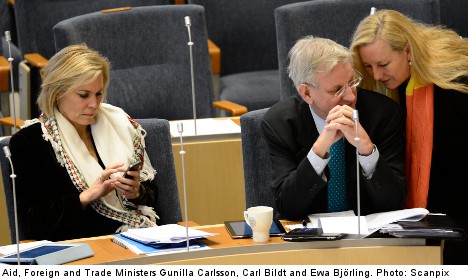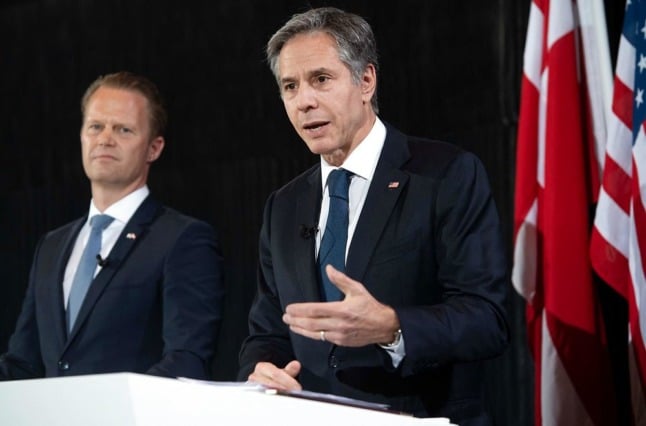“Ferry lines, transport corridors and fibre optic cables are linking the old Hanseatic network back together, ushering in a new age of prosperity,” Carl Bildt said in his Wednesday address to the Swedish parliament.
He also welcomed Russian WTO membership.
He underlined increased military cooperation with Sweden’s Nordic neighbours, both at home and in joint operations abroad such as Afghanistan.
Sweden and Finland will help Norway to police Icelandic airspace by 2014, he said.
Bildt also prioritized the EU in his speech, calling it a “force for peace” and warning that individual member states’ woes should not distract from that analysis.
He welcomed would-be union members but briefly outlined their challenges, including organized crime in Montenegro and the challenges of political cohesion in Bosnia & Herzegovina and also Albania.
Moldova, meanwhile, was making progress, Bildt said, while Ukraine was “at a standstill” and Belarus was choosing “to isolate itself”.
He expressed more hope about progress in Turkey.
“We welcome Turkey’s ongoing modernization as a step towards full membership. We hope that a new constitution will ensure full rights and freedoms for everyone,” Bildt said.
“We welcome the additional steps that have been taken to improve the rights of Kurds.”
Bildt then turned to the Arab Spring, saying developments in the Middle East two years after pro-democracy uprisings began were today “dominated by challenges and tragedies”.
“It was a revolution of rising expectations that propelled the Arab awakening. But if opportunities do not materialize, we risk a revolution of disappointed expectations,” he said.
The EU, he underscored, was working with Tunisia, Jordan and Egypt on reform, but said “we have demands, in particular for women’s and minorities’ rights”.
He also took a critical stance on Israeli settlements and said “excessive violence” towards Palestinians had to end, before urging both parts of the conflict to work together to find a resolution.
“This vicious circle must be broken before it destroys the potential for a two-state solution and leads the region into new devastating wars,” he said.
As Bildt wrapped up his speech, foreign policy spokespersons for the other parties in parliament were welcomed to address the Riksdag.
Social Democrat spokesman Urban Ahlin welcomed Bildt’s Nordic focus, but said that the United Nations did not receive enough attention in the government’s foreign policy, calling Sweden’s UN engagement “poor”.
He also urged Sweden to recognize a Palestinian state.
Bodil Ceballos of the Green Party took over the debate from there, arguing that Sweden needed to be a leader in climate and environment issues, despite Bildt’s assertion minutes earlier that Sweden had ambitious environmental targets.
The Sweden Democrats spokeswoman instead took aim at Bildt’s EU optimism. Julia Kronlid said Sweden had fallen into an “EU-friendly slumber” and argued that Swedes should be awarded the chance to express their views on EU membership in the way Britons will be able to do following Prime Minister David Cameron’s promise of a referendum.
Once Bildt was given a chance to respond, he took a jab at the Sweden Democrats, saying they wanted “to keep the world out of Sweden and Sweden out of the world”.
The Left Party’s Hans Linde criticized the government’s foreign policy for helping the powerful at the expense of the powerless. He accused the government of investing in firms that contribute to poverty.
The Liberal Party (Folkpartiet), a key ally and coalition partner of Bildt’s Moderate Party, took aim at the what he called the unclear content of the opposition’s would-be foreign policy.
Spokesman Fredrik Malm said the foreign policy of the red-green opposition parties was like “frozen lasagne”.
“Nice on the outside, but you never know what’s inside,” said Malm.
Malm continued that Swedes need to understand that issue of refugees constitute a permanent, rather than temporary, issue.
He also echoed party leader Jan Björklund’s comments earlier in the week by calling for an increase in defence spending, and also said it was time for Sweden to join Nato, a long-standing Liberal Party desire.
David Landes, Ann Törnvist



 Please whitelist us to continue reading.
Please whitelist us to continue reading.
Member comments